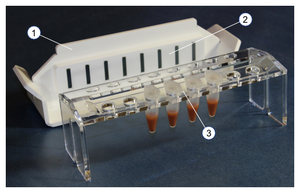MagRack 16
Magnetic Rack for DNA/RNA separation with magnetic beads
| Catálogo Nº | Apresentação | Preço (R$) | Comprar / Observação |
|---|---|---|---|
| PP-230 | 1 pc. | Sob demanda | Adicionar ao Carrinho |

Fig. 1: MagRack16 (1. Magnetic base, 2. Segmented magnetic collector, 3. Transparent tube stand)

Fig. 2: A - Collection of magnetic particles, B - Resuspending magnetic particles
For general laboratory use.
Envio: shipped at ambient temperature
Condições de armazenamento: store at ambient temperature
Validade: n/a
Descrição:
MagRacks are designed to optimize DNA/RNA/protein preparations with magnetic micro- and nanoparticles (magnetic beads) in standard 1.5 or 2.0 ml tubes. Using MagRacks allows fast and simple isolation procedures from various biological materials. In general, magnetic beads significantly increase the speed of isolation procedure compared to classical solution- or membrane-based methods. Avoiding all centrifugation steps and replacing them by magnetic separation is the key point to process optimization and automatization of DNA/RNA isolation procedures. Magnetic racks provide fast and reliable separation of particles from a liquid phase. The particles are safely collected on the tube wall without centrifugation. In contrast, particles of nonmagnetic sorbents often separate from a pellet causing loss of isolated substances.
Caution of Strong Magnetic Field
Magnetic fields can cause damage to magnetic storage media including credit cards, magnetic data tapes and computer hard drives. Strong magnetic fields can cause implanted heart pacemakers and cardioverter defibrillators to cease operation. Keep any electronic devices at least 1 meter away from the magnet. Interaction with metallic objects may produce pinch hazards.
General transportation and operation rules
Avoid hard shocks and falls of the magnetic rack and follow precautions described above during transportation and daily work. Do not store the rack near electronic and precision mechanical devices. Wash the rack only with warm water and soap in case it becomes dirty. Do not clean it with aggressive washing liquids or abrasive materials.
Working with the magnetic rack
Place tubes with their lids outside into the wells of the transparent tube stand (Fig. 1). Tubes can be additionally placed into the enclosed 8x tube strips if required. Using tube strips allows faster transfer of tubes between compatible devices.
To separate particles, place the transparent tube stand on the magnetic base (Fig. 2A). Separation of particles begins immediately and proceeds very fast due to the strong magnetic field generated by the collector. When particles are collected, the liquid phase of the tubes can be removed. The top part of the rack must remain on the magnetic base during the whole separation process to avoid diffusion of magnetic particles into the liquid phase. To remove the liquid phase from tubes an automated aspirator is recommended but working with a regular pipette is possible as well.
For resuspending particles in the tubes or adding new components the transparent tube stand is removed from the magnetic base (Fig. 2B). Particles can be resuspended by manual pipetting, using a handheld laboratory mixer or vortexing.
